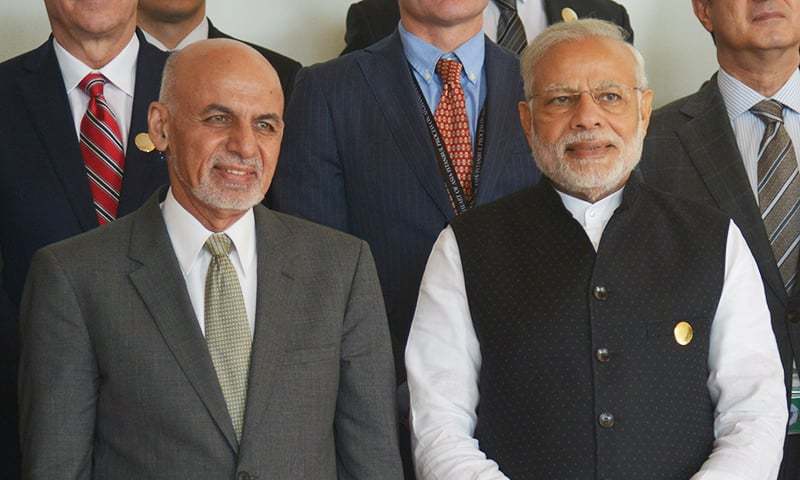Imtiaz Gul |
Afghanistan’s Khaama Press news agency on Saturday quoted President Ashraf Ghani as saying that “Pakistan is in isolation but an isolated Pakistan is not in favor of Afghanistan.” The country must be encouraged to refrain from supporting terrorist groups, an obvious reference to the Afghan Taliban’s sanctuaries in the border regions.
Ghani made these remarks during a meeting with local tribal elders of southern Kandahar province Friday evening.
It is an opportunity because President Ghani’s “less hostile and diagnostic” tone on the disadvantages of an “isolated Pakistan” to Afghanistan reflects the realization that such attempts (by India) will only precipitate his country’s fragility and insecurity.
If reported correctly by the news agency, Ghani’s quote on Pakistan offers some glimmer of hope as far as the bilateral relations are concerned, particularly to the context of the bloody exchanges of fire and loss of life in the Spin Boldak district near the Durand Line earlier this month.
Read more: What halts India and Afghanistan from making peace with Pakistan?
Ghani’s remarks coincided with two important statements. One by US Forces in Afghanistan said at least 750 militants affiliated with the Afghan chapter of the Islamic State of Iraq and Syria (ISIS) – ISIS Khurasan – were killed in the past two-and-a-half months in Afghanistan. Their territory and fighting strength have been reduced two-thirds.
The second statement emanated from the North Atlantic Treaty Organisation (NATO) Headquarters. Released May 19 after a stakeholders’ meeting it said all members reaffirmed their commitments to sustainable security in Afghanistan and to their strong partnership with Afghanistan.
For Pakistan, this situation represents both an opportunity as well as challenges.
It is an opportunity because President Ghani’s “less hostile and diagnostic” tone on the disadvantages of an “isolated Pakistan” to Afghanistan reflects the realization that such attempts (by India) will only precipitate his country’s fragility and insecurity.
Also, if one were to go by the optimism of some pro-active and well-meaning Afghan officials, Pak-Afghan acrimony probably has already peaked (because of acts of terrorism in February and March) and now may be heading for de-escalation. They believe that the relationship is not entirely lost yet.
“The way the Pakistani Army ceased fire at Spin Boldak within ten minutes on our request early this month did reflect that if elements on both sides are receptive to engagement we can salvage the situation for the better.”
– Dr. Omar Zakhilwal (the Afghan ambassador and the special presidential envoy)
Read more: Bringing Afghanistan and Pakistan close: Will China’s efforts bear fruit?
To be fair to him, the envoy has been caught between the proverbial deep sea and hard rock ever since he assumed charge over a year ago; because of tensions resulting from a string of high-profile terror attacks in Afghanistan and Pakistan, he has kept shuttling between the two capitals as a literal firefighter to douse fires of acrimony arising out of a situation that is a direct result of both bilateral, multi-lateral and geopolitical contexts.
This context throws up several daunting challenges for Pakistan, which has been struggling to disprove allegations of any direct institutional support to the Afghan and Haqqani Taliban.
Firstly, key leaders of the former Northern Alliance never trusted Pakistan. Inherently pro-India, the NA’s armed wing Shoorai Nazar filled ranks of the entire security apparatus, i.e. police and the army, in the post 9/11 formative years of the Afghan National Defence and Security Forces (ANDSF). Most of them today occupy key positions in the leadership ladder.
Secondly, a lot of former socialists – erstwhile associates of the Parcham and Khalq factions of the Afghan National Democratic Party – also hold important operational positions in the security and bureaucracy.
Thirdly, all of these key stakeholders continue to serve as the prism through which both India and the United States look at Pakistan. In this context, the latest NATO expression of continued support to Afghanistan amounts to a reiteration of confidence in the capacity of the ANDSF. Despite all the negatives associated with the three power centers dividing Kabul government i.e. Ghani, Dr. Abdullah, and Hamid Karzai, leading NATO members such as the United States and the United Kingdom seem to stand by President Ghani and the convergence of views on the role of Afghanistan’s neighbors.
Read more: Pakistan and Afghanistan: Victims of each other?
The most important one is how much and at what pace is the internal recalibration of the national security parameters is currently underway. Are all stakeholders pursuing it in unison?
Fourth, the Indian influence over the ANDSF and key ministries such as Foreign, Interior, and Trade, represents probably the biggest hurdle to the resumption of formal dialogue between Kabul and Islamabad. It is sheer geopolitics playing out in and through Afghanistan.
Nothing could better explain this geopolitical play-out than the two big terror incidents that took nearly three dozen lives in Balochistan on a day when leaders from 29 countries and international institutions had gathered for Belt and Road Forum.
Fifth, and the most important one is how much and at what pace is the internal recalibration of the national security parameters is currently underway. Are all stakeholders pursuing it in unison? If not, then surmounting these challenges and turning them into an opportunity will remain a formidable task. This could also strain Pakistan’s strategic partner China, which primarily shuns confrontation in favor of collaboration for peace and economic development.
Imtiaz Gul is the founder and Executive Director of the Centre for Research and Security Studies (CRSS), an Islamabad-based think tank. He is the author of Pakistan: Pivot of Hizbut Tahrir’s Global Caliphate. This article was originally published in Daily Times and has been republished with permission. The views expressed in this article are the author’s own and do not necessarily reflect Global Village Space’s editorial policy.














